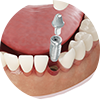Dental implants vs dentures: How to choose
Weighing up the pros and cons of dental implants vs dentures is a tough task, made even more difficult by the fact that which one is the best choice for you depends on lots of factors.
We’ve put together a complete guide that will help you decide between the two main tooth replacement treatment options, covering how they both work and what the key differences between them are.
Reading time: 4 minutes

What are dental implants and dentures?
Dental implants and dentures are two popular treatment options for replacing missing teeth. But, despite being used to achieve the same outcome, they’re very different technologies.
Dental implants are small metal screws that essentially act as artificial tooth roots. They’re inserted into the jawbone to provide a stable foundation for individual replacement teeth, which are attached to the exposed part of the screw to sit above the gumline.
Dentures, on the other hand, are removable prosthetic devices that fit over the gums to replace missing teeth. They come in two main types: partial dentures (replacing specific missing teeth) and complete dentures (replacing a full row of missing teeth).
Key differences between dental implants and dentures
Dental implants and dentures are different in lots of ways, from the materials they’re made of to the amount of time you can expect them to last. The table below provides a quick overview of the key differences between these two tooth replacement methods:
 Dental implants |
 Removable dentures |
|
| Overall Considerations | ||
| Material | Titanium (implant screw) and porcelain or similar tooth-like material (replacement teeth) | Acrylic, metal, or nylon |
| Procedure | Surgically implanted into the jawbone, typically under local anaesthetic | Custom made from a non-surgical impression of the upper or lower jaw/gum |
| Comfort (More comfortable than removable dentures?) |
|
N/A |
| Cost (Average Price Range) |
|
Moderate |
| Function (Can restore chewing ability?) |
|
Partially impacted ability |
| Feeling (Sensation in the mouth) |
|
Removable, feels less natural |
* Results in this table show average results only and do not necessarily apply to each specific case.
**The comparison chart above has been meticulously crafted through research conducted by numerous dental institutes, research companies, and universities. If you wish to delve deeper into the scientific resources underpinning this information, please click here.
Procedure for dental implants vs dentures
Dental implants are fitted through a surgical procedure which is typically carried out under local anaesthetic. It involves making a small incision in the gum at the site of a missing tooth, before affixing a dental screw to the jawbone beneath. A replacement tooth is then attached to the exposed part of the screw to sit in place above the gumline.
The denture procedure is less invasive, involving an initial impression being made of the affected part of the mouth. This impression is then used to create a custom denture, comprised of a plate that simulates the mouth palate and gum and individual false teeth mounted in the right place to replace missing ones.
Cost of dental implants vs dentures
The cost of dental implants varies depending on a range of factors, including the type of implant and materials used. However, patients can generally expect to pay between £1,000 and £2,800 for a single tooth implant.
Dentures also vary in price depending on whether they’re partial or complete and how high-quality the materials used are. Typically, though, a mid-range set of complete dentures will cost around £1,000 and a premium set from £1,500 to £2,500.
Look and feel of dental implants vs dentures
After a brief period of recovery following the procedure, dental implants will feel just like a natural tooth. They also look practically indistinguishable from natural teeth and can be brushed and flossed as normal.
Although there’s no recovery period for dentures, given that they don’t require surgery of any kind, new users may go through a period of adjustment during which the dentures feel uncomfortable while chewing or speaking.
Longevity of dental implants vs dentures
Dental implants are a long-term solution for missing teeth, made of durable materials like titanium and porcelain. Although their longevity depends on various factors, it’s not uncommon for dental implants to last for 20-30 years with proper care.
Dentures are a less permanent solution. They’re removable, often only held in place with adhesive, and may need to be replaced or adjusted over time due to changes in the jawbone or gums.
Bone preservation of dental implants vs dentures
After losing a tooth, the surrounding bone in the jaw can weaken and decay over time through a process called bone resorption. In fact, one study found that the jawbone can reduce in width by up to 25% in the first year after tooth loss.
Dental implants can prevent bone resorption, with the implant screw reinforcing the jawbone structure and the replacement tooth reintroducing the forces caused by chewing to the affected area.
This isn’t the case with dentures, which means that the process of bone resorption can continue. And, as the jawbone degrades further, the fit of dentures can loosen to the point where they need to be adjusted or replaced.

The pros and cons of dental implants vs dentures
In lots of cases, both dental implants and dentures are viable methods for replacing lost teeth. To decide between them, patients have to weigh up their relative pros and cons in the context of their own unique situation.
The main pros for dental implants vs dentures:
- Provide a longer-lasting solution for missing teeth
- Offer better stability and functionality
- Can be cleaned and maintained just like natural teeth
- Stimulate bone growth to preserve the jaw’s integrity
The main cons of dental implants to be aware of:
- Generally more expensive upfront than dentures
- Involve a surgical procedure under local anaesthetic
- A bone graft can be required for dental implants with bone loss (although mini dental implants can often offer an alternative)
How to choose between dental implants and dentures
Whether dental implants or dentures will be best for you depends on lots of factors, including how many teeth you need replacing, the density of your jawbone, and your budget.
As a rule of thumb, though, dental implants are generally the better choice if you want a more permanent and robust treatment, while dentures might win out if keeping costs low is your primary concern.